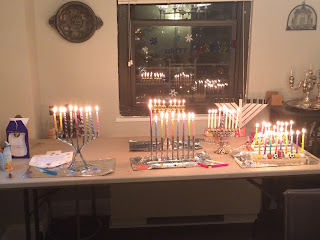Are there any Jewish lessons to be learned from this time of the
year?
Here’s one:
You can get a Kosher Pareve “Merry Christmas” cake! J
For the most part, the Jewish Christmas experience remains in
the realm of Chinese food, movies, and pop culture (like this Saturday
Night Live video short).
I think that this season of another religion’s celebration can
give us something to think about from a Jewish perspective. Here are two things I have been thinking
about this season. (Some of what follows
is adapted from my
sermon this past Shabbat at KJ.)
1) It’s time for muscular
Judaism.
I just read a very
interesting piece in the Wall Street Journal entitled “The Death of
God is Greatly Exaggerated.” It focuses
on Eric Metaxas, an author, radio host, and speaker, who is a proponent of “muscular
Christianity.” What is muscular
Christianity? Metaxas is a strong
proponent that faith has a role in all discussions
I think Judaism should be a little more muscular.
Judaism has something to say about every aspect of our lives. We should look to the Torah and not shy away
from letting our faith influence how we approach the issues of the day.
Issues such as poverty, hunger, immigration, and strengthening
families are among the issues which religious perspectives can be beneficial. We often say, “Eitz chaim hi,” that
the Torah is a tree of life. It is a way
of life, and we should not shy away from looking to its teaching to address the
issues of the day.
2) Let’s talk more about
faith.
I have watched parts of Midnight Mass on Christmas Eve. I am intrigued by what is done and what is
said. I am no expert, but I notice a
tremendous appreciation of the sacred, expressions of faith, and acceptance of
the mysterious in the portions I have seen.
This gets me thinking about the role of faith and holiness in
Judaism. It goes without saying how
fundamental these ideas are in Judaism, but we focus on more on deed than
creed. While Judaism is far more about
the mitzvoth (actions), we ignore the Godly and spiritual aspects at our own
peril.
On the last day of classes before winter break, I taught my
Ramaz seventh graders the “Halakhot of Vacation.” I gave them a sheet with selections from Rabbi
Yechiel Michel Ha-Levi Epstein’s Aruch Ha-Shulchan. In the very first chapter
(Chapter 1, section 5), he states:
A foundation of Torah
and a central pillar of Judaism is to know there is only one, unique, indivisible
God who created the universe and continues to supervise the world every hour of
every minute.
You may ask what this has to do with vacation. The answer is that being Jewish means knowing
and having a relationship with God. Whether it is in school or shul or on
vacation, Judaism is built upon a relationship with the Divine. This is at the
core of our religion, yet it is not a theme often heard in the school or synagogue.
My encounter with Midnight Mass got me thinking about how to add
more of the sacred and God awareness in to Judaism. The religious celebration of others can and
should lead to a strengthening of our own faith and religious experience.












